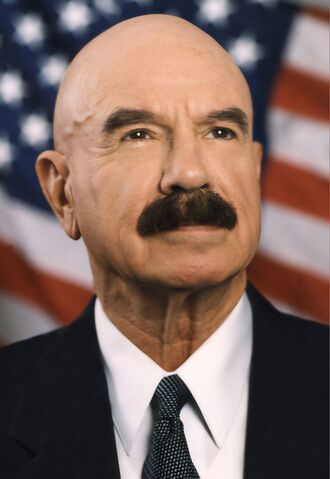G. Gordon Liddy

|
| “ | Obviously, crime pays, or there'd be no crime. | „ |
| ~ G. Gordon Liddy |
George Gordon Battle Liddy (30 November 1930 - 30 March 2021) was an American lawyer, FBI agent and leader of the White House Plumbers, a special operations unit established in order to prevent sensitive information relating to the presidency of Richard Nixon from leaking out. In 1972, Liddy and several other White House officials were prosecuted after being implicated in the Watergate scandal. Liddy was convicted and sentenced to 20 years in prison.
Liddy has often been described as the "mastermind" of the Watergate scandal.
Biography[edit]
Liddy was born in Brooklyn on 30 November 1930. In 1957 he joined the FBI and apprehended one of their 10 Most Wanted fugitives, Ernest Tait, in 1960, subsequently being appointed to J. Edgar Hoover's personal staff. Despite this Liddy gained a reputation for incompetence and recklessness among his fellow agents, once being arrested in Kansas City while undercover.
Liddy resigned in 1962 in order to become a prosecutor in New York, leading many drug raids during his time as prosecutor. In 1968 he ran in the Republican primaries for New York City District Attorney, losing by a close vote to Hamilton Fish IV. He ran with the Conservative Party of New York State instead, but was convinced to withdraw from the race by being offered a position in the treasury.
After Richard Nixon's election in 1969, Nixon was sent to work in the Executive Office with David Young, John D. Ehrlichman and Egil Krogh, all of whom would later be indicted over the Watergate scandal. In 1972 Liddy, Young and E. Howard Hunt were placed in charge of the White House Plumbers unit in order to prevent sensitive information being leaked to the press and potentially damaging Nixon's re-election campaign. Liddy came up with several ideas to embarrass the Democratic Party, including kidnapping Democratic officials and photographing them in compromising positions with prostitutes. Almost all of his ideas were rejected, however a few were approved, such as a break-in at the office of Daniel Ellsberg, who had leaked top-secret papers to the New York Times.
Watergate scandal[edit]
On 27 January 1972, Liddy presented a campaign intelligence plan to the Committee for the Re-Election of the President that involved extensive unlawful activities against the Democratic party. His initial plan was rejected by CRP chairman Jeb Magruder, Attorney General John N. Mitchell and Presidential Counsel John Dean; however, two months later the three of them approved a smaller-scale version of Liddy's plan which involved breaking into the Democratic party's headquarters, the Watergate complex, in order to photograph campaign documents and install listening devices.
In May, Alfred Baldwin was assigned to bug the Watergate complex's phone lines and monitor the phone conversations afterwards. After this failed to produce any meaningful results, Liddy and Hunt assigned a five-man team consisting of James McCord, Virgilio Gonzalez, Bernard Barker, Eugenio Martinez and Frank Sturgis to break into the complex on 28 May and wiretap the office phones, with Baldwin acting as a spotter. This was successful, with the phones of DNC chairman Larry O'Brien and Association of State Democratic Chairmen director Robert Spencer Oliver being bugged.
Although the operation was a success, it was soon deemed that the devices needed repairs, so McCord's team was deployed again on 17 June. However, security guard Frank Wills became suspicious after finding the latches taped open and called the police. Baldwin, watching from across the street, was distracted by the film Attack of the Puppet People on TV and failed to warn the others about the incoming police, who arrested McCord and his team. Upon hearing of the failure, Liddy called Magruder and informed him of McCord's capture, sparking an operation to conceal all evidence of White House involvement in the break-in.
Within hours of the burglar's arrest, police had found contact details for G. Gordon Liddy and E. Howard Hunt in the address book of Barker and Martinez. However, all documents relating to the operation in Liddy and Hunt's possession were destroyed by Dean and L. Patrick Gray under the orders of John Ehrlichman. Despite this, the CRP came under suspicion after it was discovered that all five Watergate burglars were somehow connected to the organization. Liddy in particular came under suspicion when the FBI found that he had deposited $25, 000 in the bank account of one of the burglars and then attempted to conceal its origin.
After President Nixon's re-election, he attempted to further conceal any involvement in the break-in. However, various court hearings called witnesses who further implicated White House officials, including Liddy and Hunt. Liddy was charged with burglary, conspiracy, illegal wiretapping and failure to testify before a Senate committee. He was convicted and sentenced to 20 years in prison and a $40, 000 fine after admitting to his role in the conspiracy. He was paroled in 1977, after serving 4.5 years. Liddy was one of 20 White House officials jailed over the Watergate scandal.
After Watergate[edit]
Following his release from prison, Liddy became a radio host until his retirement in 2010. He ultimately died of Parkinson's Disease on 30 March 2021.
Gallery[edit]
- Important
- Male
- Modern Villains
- Deceased
- United States of America
- Republican Party villains
- Imprisoned
- Corrupt Officials
- Lawful Evil
- Criminals
- Liars
- Political
- Saboteurs
- Cheater
- Fallen Heroes
- Partners in Crime
- Government support
- Conspirators
- Wolves in sheep's clothing
- Incriminator
- Mastermind
- Vocal Villains
- Islamophobes
- Xenophobes
- On & Off Villains
- Grey Zone
- Hypocrites
- Redeemed


